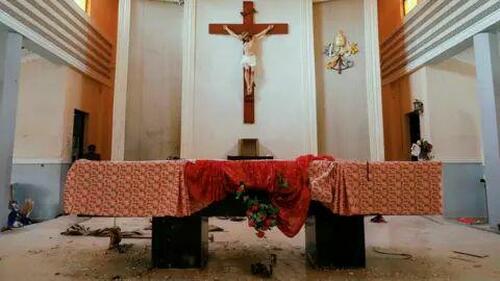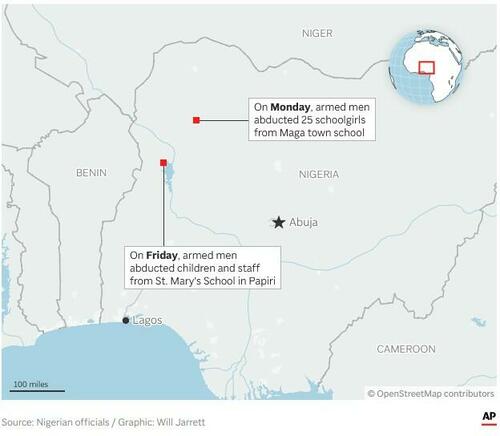Nigerian Gunmen Abduct Over 200 Christian Children, 12 Teachers In Boarding School Attack
Armed men attacked a Catholic boarding school in northcentral Nigeria’s Niger state in the early hours on Friday, abducting 215 students and 12 teachers, according to Daniel Atori, a spokesperson to the Niger state chapter of the Christian Association of Nigeria.

“I have just got back to the village this night after I visited the school where I also met with parents of the children to assure them that we are working with the government and Security agencies to see that our children are rescued and brought back safely,” Atori said in a statement.
The attack and abductions took place at St. Mary’s School, a Catholic institution in the Agwara local government’s Papiri community, said Abubakar Usman, the secretary to the Niger state government. He neither disclosed the number of students and staff abducted, nor who might be responsible for the attack. -AP
“We don’t know what is happening now, because we have not heard anything since this morning,” said Dauda Chekula, 62, whose four grandchildren were among the abductees. “The children who were able to escape have scattered, some of them ran back to their houses and the only information we are getting is that the attackers are still moving with the remaining children into the bush.”
The abduction is the latest in a spate of attacks on Christians in Africa’s most populous country, and happened just days after 25 schoolgirls were abducted in a neighboring state.
While no description has been given for the attackers, the schoolgirls are suspected to have been taken by ‘gangs of bandits.’
As Susan Crabtree of RealClearPolitics writes:
The timing and nature of the attack placed the fate of Nigerian Christians in stark relief. On Monday, in the early hours of the morning, a group of gunmen attacked a girl’s boarding school in northwestern Nigeria, kidnapping 25 girls, many of them Christian. The attack killed the school’s vice principal, Malam Hassan Makaku, who tried to block the door to the girl’s dormitory with his body.
The gunmen’s assault on the school took more than 20 minutes and failed to prompt any intervention from government security forces located at a checkpoint not far from the school.
The attack also took place amid new scrutiny and calls to action by President Trump. The president in late October vowed to stop the slaughter of Nigerian Christians, whom Muslim terrorist groups, including Boko Haram and Faluni militants, the Islamic State of West Africa Province, as well as armed bandits, have targeted and slaughtered by the thousands in recent years.
The abduction of the girls served as a reminder of former first lady Michelle Obama’s failed hashtag campaign to rescue 276 mostly Christian girls kidnapped by Boko Haram from a school in Chibok, Nigeria, in 2014. A decade later, 82 of the girls remain missing, and a United Nations investigation found that only 37% of schools across Nigeria have any warning system to detect threats of violence and armed attacks.
The deadly attack on the school also came the same week U.S. officials planned to highlight the plight of persecuted Christians in Nigeria at the United Nations and in Congress.
Ambassador to the United Nations Mike Waltz, singer Nicki Minaj, and religious freedom advocates gathered in New York Tuesday and joined a panel hosted by Fox News anchor Harris Faulkner. Rev. Gabriel Makan, a pastor from northern Nigeria, and Sarah Makin, former senior advisor on religious freedom in President Trump’s first administration, joined the panel to call for renewed diplomatic engagement and stepped-up actions from the Nigerian government.
Waltz, Minaj, and the other witnesses chronicled the loss of girls into what they fear is a life of sex slavery, the burning of churches, and beheadings of pastors. Entire villages, Waltz said, wake to gunfire because “they dare to commit the crime of calling Jesus their Lord, [and] people go to jail under blasphemy laws for simply wearing a cross.”
For years, religious freedom advocates have called on the U.S. government to address the slaughter of Christians in Nigeria. Trump, in his first term, designated Nigeria a “Country of Particular Concern,” but President Biden reversed that decision. In late October, Trump once again redesignated Nigeria as a CPC and vowed to do everything in his power, including have the U.S. military come in “guns blazin’,” to stop the violence.
“Protecting Christians is not about politics – it is a moral duty,” Waltz said Tuesday. “We need voices that pierce the silence we have heard from the international community, that humanize the statistics we keep hearing, and demand accountability.”
“Religious freedom means we can all can sing our faith regardless of who we are, where we live, and what we believe,” Minaj told the panel. “But today, faith is under attack in way too many places. In Nigeria, Christians are being targeted, driven from their homes and killed. Churches have been burned, families have been torn apart, and entire communities live in fear constantly, simply because of how they pray.”
New Jersey GOP Rep. Chris Smith in previous Congresses introduced bipartisan legislation calling for more action to stop what he considers a Christian genocide in Nigeria. On Thursday, Smith will lead a House Foreign Affairs Committee hearing on Trump’s renewed call for action.
Christians make up nearly half of Nigeria’s population of 200 million, but they are the victims of the vast majority of the attacks. Today, Nigeria is the most dangerous place in the world to be a Christian, according to leading religious freedom advocates.
The World Index of Christian Persecution states that Nigeria is where 89% of Christian killings throughout the world took place over the last several years. According to a report by Open Doors, a watchdog that tracks Christian persecution, attacks against Christians in Nigeria are on the rise, with 7,000 Christians dying in the first eight months of this year, up roughly 2,000 from recent years.
The Biden administration attributed the slaughter of Christians in Nigeria, which make up nearly half the population, not to religious persecution but to a conflict over resources exacerbated by climate change. Open Doors and other advocates ardently disagree about the main motivation, although most groups involved believe the conflict isn’t just religious in nature but also involves conflicts over power and control over land and resources because Christians own most of the farming areas.
Kidnapping, which helps fund Islamist terrorist groups, is big business for abductors in the lawless areas of northern Nigeria. More than 20,000 people have been abducted in Nigeria from 2019 to 2023, according to Open Doors. Roaming bandits target people wo will pay ransoms, and they’ve learned that Christians and religious leaders will respond with higher payments than others.
For these reasons, some groups, including the Vatican, have pushed back on the narrative that the slaughter of Christians is primarily religious persecution. According to Cardinal Pietro Parolin, the Vatican’s secretary of state, the root causes are “social” in nature rather than fully religious. The Trump administration rejects that assessment, arguing it’s a war on Christians by mainly Muslim extremist groups.
Regardless of the cause, the impact is alarming. Nigeria remains the world leader when it comes to the killing of Christians. The question now: What can the Trump administration do about it?
Trump, in his late October Truth Social post, vowed U.S. military action if the Nigerian government fails to take immediate action. Such a development, if it involved sending U.S. troops into Nigeria, would likely not only anger Trump’s isolationist MAGA base but could prove ineffective against roving bands of militants and terrorists in such lawless regions.
Nigerian President Bola Tinubu, who is Muslim, pushed back against Trump’s threat of military action, instead calling for non-military assistance from the U.S. and interested parties “to deepen cooperation and protection of communities of all faiths.”
Tinubu, who was elected in 2023 and faces reelection in 2027, is viewed as a far more honest broker than his predecessor, Muhammadu Buhari, a Muslim who shared his heritage with the Faluni ethnic group responsible for most of the attacks on Nigerian Christians. Tinubu’s wife is a Christian, which likely has tempered his approach.
A senior State Department official told RealClearPolitics that Trump is keeping all options on the table but noted that there is a “whole suite of options” the administration is considering, including serious economic sanctions. The official also noted the geographic complexity of the problem because in the northeastern area of the country the bad actors are Boko Haram and ISIS, while in the Middle Belt it’s Fulani militants.
The key to Tinubu’s reelection is managing “this delicate religious balance,” the official added.
“This is an opportunity for the Nigerians to show that they share this principle [of religious freedom], and they’re willing to take action on this for the benefit of our people,” the official said, noting that it requires the Nigerian government to increase its “prioritization of this issue” and “allocate resources appropriately.”
While Tinubu appears open to Western assistance to crack down on the attacks, the real problem lies with the flow of firearms to different lawless regions and corrupt funds to the local governors of the different states, several of whom are in league with the extremist groups responsible for the violence, according to a source on the ground in Nigeria. Many of those firearms, the source said, are flowing into Nigeria from Arab states, including Saudi Arabia.
Trump this week gave Saudi Crown Prince Mohammed bin Salman a lavish welcome at the White House and even defended him over the 2018 killing of Washington Post journalist Jamal Khashoggi by Saudi agents, which U.S. intelligence agencies have concluded the crown prince approved. The White House’s renewed U.S. -Saudi partnership brings new hope to ending regional tensions with Iran and cementing the Israeli-Hamas peace deal.
But any talks of U.S. weapons sales to Saudi Arabia should also include pledges to lead an effort to stop the sales of firearms to Nigerian terrorists and militants, critics argue.
U.S. officials are planning to host a senior Nigerian delegation in Washington at the end of this week to get a better idea of short- and long-term goals and any sticking points.
“The flow of illicit weapons is just magnifying the problem there, so it’s one of the key factors that we’re going to look at, especially in the Middle Belt piece of this when we’re talking about ISIS and Boko Haram,” the State Department official said. “How these Fulani ethnic militias, which the Nigerians claim are just farmers – how they end up with heavy artillery to conduct these raids is a fundamental question.”
The State Department is in the process of conducting a review of all U.S. aid to Nigeria, including security cooperation and humanitarian and economic assistance.
“Our preferred option for them is to recognize the seriousness of the situation and act accordingly, in good faith with us, so we can all see results, and we don’t need to discuss any of these punitive aspects,” the official said.
Tyler Durden
Fri, 11/21/2025 – 18:50ZeroHedge NewsRead More





 R1
R1
 T1
T1


